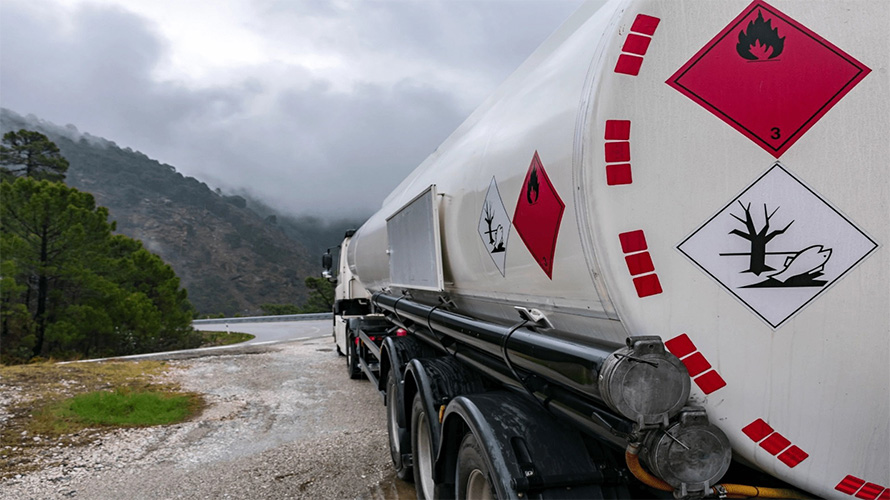Transportation of Dangerous Goods (Chemicals, Flammable Materials, etc.) by Road

The transportation of dangerous goods, including chemicals, flammable, toxic, and radioactive materials, requires strict adherence to safety regulations and specialized protocols. Due to their high-risk potential to humans, the environment, and property, these shipments are governed by specific international and national laws. This article examines the requirements and best practices for transporting such materials.
Part 1: Classification of Dangerous Goods
9 Main Classes of Dangerous Goods (According to IMDG and ADR Regulations):
- Explosives
- Gases – Flammable, non-flammable, toxic
- Flammable Liquids
- Flammable Solids
- Oxidizing Substances
- Toxic and Infectious Substances
- Radioactive Material
- Corrosives
- Miscellaneous Dangerous Goods
Part 2: Legal Requirements and Permits
Required Documents:
- Dangerous Goods Transport Permit from the Road Maintenance and Transportation Organization
- Material Safety Data Sheet (MSDS)
- Driver Training Certificate (ADR Certificate)
- Dangerous Goods Waybill
- Provincial and International Permits (if applicable)
Vehicle Specifications:
- Leak-proof and impact-resistant tanks or body
- Fire alarm and suppression systems
- Safe unloading equipment
- Warning plates and labels (e.g., diamond-shaped hazard signs)
Part 3: Safety Considerations During Transport
1. Specialized Packaging:
- Use leak-proof and corrosion-resistant containers
- Clear labeling with international hazard symbols
- Separation of incompatible materials (e.g., acids and bases)
2. Safe Loading and Unloading:
- Use spark-proof equipment
- Unloading stations equipped with spill containment systems
- Continuous supervision during operations
3. Routing and Planning:
- Avoid congested and sensitive areas (cities, environmental zones)
- Emergency contingency planning (fire, leakage)
- Coordination with emergency response units** along the route
Part 4: Personnel Training and Equipment
Driver Requirements:
- Completion of specialized ADR courses
- Familiarity with emergency protocols
- Regular medical examinations
Onboard Safety Equipment:
- Spill detection and containment kits
- Respiratory and personal protective equipment
- Specialized fire extinguishers (powder, foam)
- Chemical first-aid kits
Part 5: Emergency Procedures
In Case of Leakage or Fire:
- Secure the area and evacuate immediately
- Notify authorities (fire department, police, environmental agencies)
- Avoid contact with spilled materials
- Use protective equipment before taking any action
Information Required for Rescue Teams:
- Type of dangerous material (according to classification)
- Quantity of shipment
- Specific hazards (toxic, explosive, etc.)
- Location map and access points
🚛 Mokranbar’s Professional Services
- Free consultation for dangerous goods transport
- Provision of equipped vehicles meeting standards
- Coordination for all necessary permits
- 24/7 support during transit
Contact Us:
📞: +983432267383
📧: mokranbar.ir@gmail.com
📍: Kerman, Jahad Blvd., between alley 1 and 3, next to Afarnish Carpet, second floor
Conclusion
Transporting dangerous goods requires exceptional expertise, precision, and responsibility. Selecting a transport company with trained personnel, equipped fleet, and valid licenses is the only way to ensure the safety of these shipments.
By following these principles, prevent unforeseen accidents!
FAQ:
🔸 Which materials are prohibited for transport?
Some highly dangerous materials (e.g., highly unstable explosives) are completely prohibited.
🔸 What is ADR training?
A specialized course for drivers transporting dangerous goods according to international regulations.
🔸 What are the penalties for illegal transport of dangerous goods?
Heavy fines and even imprisonment are foreseen for violators.
Other Links
-
Issuance of Preliminary Approval for the Sirjan-Shiraz Roadside Service Complex under the Name of Mokran Bar Company
-
Trucking Invoice Management
-
Robotisation in the transport and logistics sector : a revolution in progress
-
On-Demand Trucking
-
Celebrating the status of a man and Father’s Day
-
Lady Zainab’s (PBUH) birthday, and Happy Nurse’s Day
-
Heavy vehicle engine maintenance tips
-
9 Trends in the Transportation and Logistics Industry to Look Out for in 2025
-
Safety tips (unauthorized speed)
-
Happy Eid al-Ghadir

New Comment
All Comments
There are no comments about this post yet!